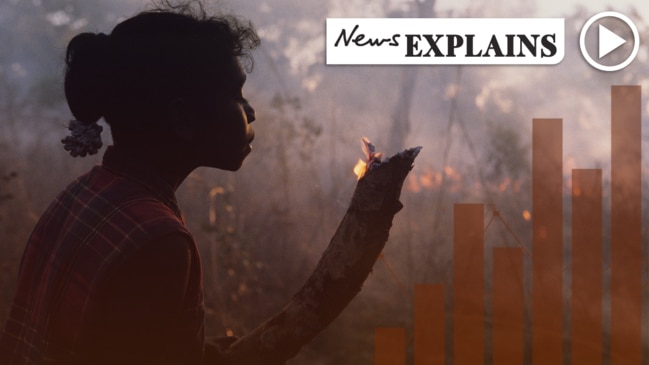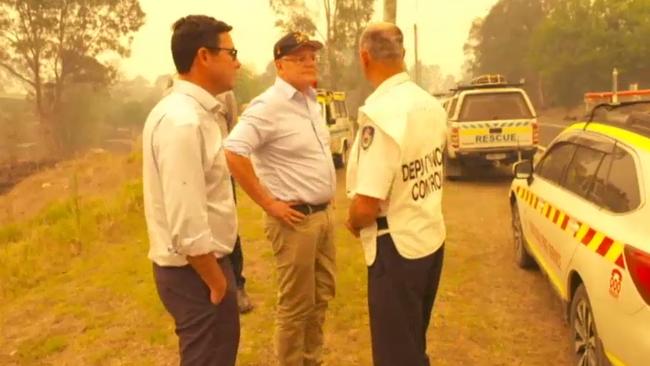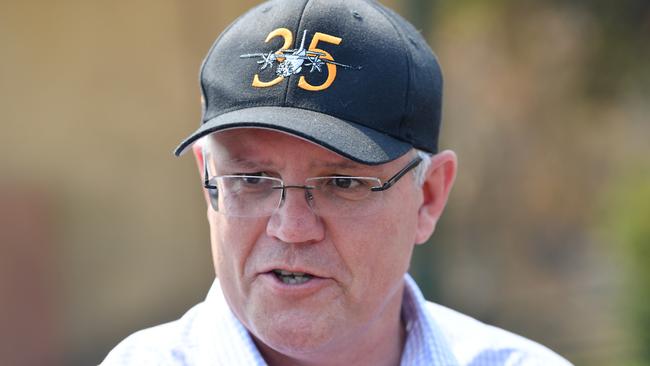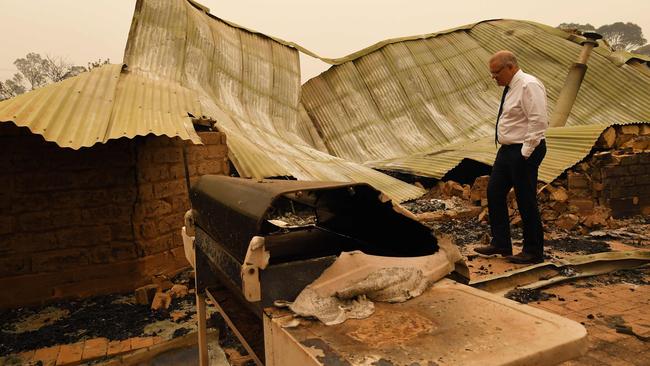David Penberthy: Scott Morrison is at risk of losing his quiet Australians
The PM we’ve seen throughout the bushfire crisis couldn’t be further from the man Australians put their trust in at last year’s election. And the biggest problem is obvious, writes David Penberthy.

Rendezview
Don't miss out on the headlines from Rendezview. Followed categories will be added to My News.
It would be a major error of judgment for Scott Morrison to reassure himself that the only people with concerns about his position on climate change are mad lefties who hate the Coalition.
The collapse in his personal approval during this hellish bushfire season has not come about because every politically obsessed loudmouth with access to an iPhone spent summer smashing him on Twitter as an environmental vandal. It has come about because many people who aren’t politically obsessed, but politically aware, have simultaneously become less impressed with Morrison’s leadership and more worried about the demonstrated effects of climate change on our country.
The Twitter brigade already hated Morrison. The abuse they unleashed over summer was in some ways a manifestation of their continuing inability to accept the fact that he won the supposedly unwinnable election last year.
The fall-off in his support comes from new and different people, people who don’t live in a Brunswick share-house or a teepee in Byron Bay. They’re just normal folks who are worried by what they have seen. And they are seeing through the baseless bleatings of the climate sceptics, who fly in the face of scientific consensus by insisting the world has not changed at the same time large parts of the world experience fires which, in their force and location, are different to those that have gone before.

This is dangerous for the PM. With a shift of this size, many of the voters within that whopping 10-point collapse in his approval rating would have to be among ScoMo’s very own “Quiet Australians”, as he likes to call the people who voted for the Coalition last year.
Some of Morrison’s collapse can be attributed to his sloppy start to the bushfire crisis. While everyone needs a holiday from time to time, the optics of our national leader posing with random tourists at a Hawaiian bar as Australia burned were poor.
That photograph alone was more damaging than a year of tweets from Mike Carlton or Clementine Ford, as it was an eminently shareable “gotcha” moment that played to the popular belief that politicians are useless, laughable and in it for themselves. It also tapped into a sentiment that was further underscored when Morrison initially made awkward visits to fire zones with nothing to announce, or with his regrettable clanger on Kangaroo Island, where, with two people having died, he expressed his relief that there had been no loss of life, only to be corrected by locals and then clunkily explaining that he was thinking of firefighters.
During last year’s election, pitted against the mortally unpopular Bill Shorten, Morrison presented himself as the dorky, baseball hat-wearing dad who was having an old-fashioned crack after accidentally becoming prime minister. His Clark Griswold act might have washed against an unloved opponent with a swag of crappy policies. But you don’t want Clark Griswold running the show during a full-blown national emergency.

These were clangers and gaffes, for which the PM has now made amends, especially with his commendable decision to deploy Australian Defence Force troops to help with the recovery effort on places such as Kangaroo Island. But while in politics you can recover from superficial or symbolic missteps, the PM has a more enduring challenge on his hands, and it’s this.
Scott Morrison appears more relaxed about climate change and much happier with Australia’s response to it than a hell of a lot of Australians are. And while that “hell of a lot” includes all the aforementioned agitators and Morrison haters who will never vote for him, it also includes plenty of people who are simply terrified by what they have witnessed or endured first-hand over this continuing bushfire season, and fear that if we and the rest of the world don’t change, our country and planet will become unliveable.
The binary, us-against-them nature of modern political argument would pit the world into two warring camps, the climate deniers and the climate believers. This at least is the way the conversation is conducted on social media. In the real world, which is more nuanced, there are plenty of us who suspect the scale and nature of these summer bushfires were fuelled by several factors.
It is eminently possible that these fires were made worse by climate change and its impact on drought, wind and temperature (which is loosely defined as a progressive position), as well as onerous native vegetation and planning laws that prevent farmers, landowners and councils from clearing land (which is seen as a conservative position).

People who don’t affix themselves with political labels like “progressive” and “conservative” want both these issues addressed. They want everything addressed, because they’re understandably alarmed, if not terrified, by what’s happened this summer.
In Scott Morrison, we have a man who has spent much of this summer sounding like a nervous wreck whenever he is asked about the role of climate change in these fires. He has seemed dismissive or defensive, be it in media interviews or when confronted by some poor punter who has just lost their house. He has become so rattled that he has struggled to enunciate any of the things his government is doing to address the climate issue, which is why he attempted to use his National Press Club speech on Wednesday to wrest back some authority by outlining his position, even though that position will still be seen by many as lacking ambition on behalf of the planet.
He has much left to do. The people Morrison needs to convince aren’t the rabid lefties who will never vote for him anyway, but those Quiet Australians who are quietly terrified about the future of the planet, and want to hear more about what’s being done and, crucially, what more can be sensibly done.
It is weird to compare the Morrison we have seen this January with the sleeves-up bloke who, upon being elevated to the prime ministership, effectively set up camp in Queensland to help farmers deal with the drought.
Voters up there rewarded him for doing so by making him PM in his own right. Voters elsewhere are responding differently to his efforts so far this year.

